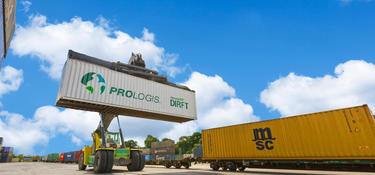The logistics sector is a critical part of the UK economy, keeping the country’s goods flowing in-line with customer demand, servicing everything from grocery stores to delivering online shopping orders.
However, the logistics sector as we know it is under immense stress, and there is a big focus on making the industry more sustainable. Whilst the traditional method of moving freight by road is still the most popular option for most companies, the industry is under pressure to explore alternatives to reduce both the economic and environmental costs associated with this method of transport.
Whilst road freight will remain an integral part of modern supply chains for many years to come, many companies are exploring options to deliver parcels and goods using rail freight, e-bikes, compressed natural gas powered and electric trucks as part of a balanced, resilient and sustainable supply chain and there are number of factors driving this shift in focus.
Climate change is now firmly on everyone’s agenda and many retailers and delivery companies face increasing pressure from their customers to prove sustainability at all points of the supply chain. Add to this an over reliance on diesel vehicles, reducing numbers of HGV drivers and pressure on government to ban all diesel HGV’s by 2040 and it’s easy to see how rail freight is gaining popularity as part of the modern supply chain mix.
Rail Freight could be the answer…
For many years, rail freight was associated with the movement of heavy, dirty substances such as coal and aggregates; however, the declining use of coal has opened-up new opportunities for intermodal transport and many large supermarkets, including Tesco and Sainsburys now use rail freight to enable fast delivery of stock to their network of UK distribution centres.
Currently, the UK rail freight industry brings an estimated £1.6 billion per year in productivity gains for UK businesses, and we expect this to grow. There is also significant government policy supporting the use of rail-served logistics.
At Prologis we know that our customers need to deliver on their promises, which is why we locate our logistics parks close to major transport networks. We also know that our customers need to stay one step ahead of changing requirements –which is why,in 2007, we offered our customers further flexibility with the opportunity to access rail freight services through our first rail-served logistics park, Prologis DIRFT in Northamptonshire.
Reducing Carbon Emissions by Rail
Our customers want and need to prove their sustainability credentials to their own customers and rail freight can help them demonstrate their commitment to the creation of a sustainable supply chain.
Each tonne of freight transported by rail reduces carbon emissions by 76% when compared to road. Each freight train in operation removes between 43 -76 lorries from our roads, slashing emissions, reducing congestion and bringing operational efficiencies and cost savings to boot.
Dispelling the myths
When you’re thinking about rail freight, speed of movement may not be the first thing that comes to mind –however, rail freight is fast, efficient and reliable.
There is also a widely held opinion that rail freight is only suitable for heavy, bulky goods; however, the variety of goods transported by rail freight might surprise you. The line which connects DIRFT to Scotland, for example, sees everything from chocolate and alcohol to televisions and clothing, making the journey by rail. Recently, Eddie Stobart announced the launch of a new rail service from the Port of Tilbury to DIRFT, with a forecast of moving 200 containers a week. Most excitingly, the service will leave Tilbury at 9am, and reaches DIRFT by 3pm, allowing customers to get fresh produce into regional distribution centres on the same day.
What’s on the cards for the future of Rail Freight?
UK railways are ranked 1st for best improved railways by the European Commission, and the government is committed to developing a clear policy framework to enable rail freight to grow and reach its potential.
Customers looking for quick, low-cost, environmentally-friendly options as part of a resilient supply chain are increasingly choosing rail freight. At Prologis DIRFT, for example, we’ve seen our customers Tesco and Sainsbury’s sharing freight train lines to increase efficiency, and this sort of collaboration is critical to the future of the rail freight industry.
This is a pivotal point for the industry, and at Prologis, we are committed to rail freight as part of our wider offering to customers, giving them the flexibility to respond to changing demand. However, for rail transportation to continue to increase its share of the logistics market and provide a viable (and complementary) alternative to road freight. There is also great opportunity to unlock the potential for rail freight to replace road freight into every urban area in the UK due to the existing rail network.
The popularity of rail freight as part of a balanced, sustainable and resilient supply chain is growing and with that growth will come challenges and opportunities in equal measure. One thing is clear, however: if we want to shift road freight onto the railway tracks, we need to work closely with customers and the rail freight industry if we are to put sustainable transportation by train on the fast track.
For more information about Prologis DIRFT please visit prologis.co.uk/parks/prologis-rfi-dirft

